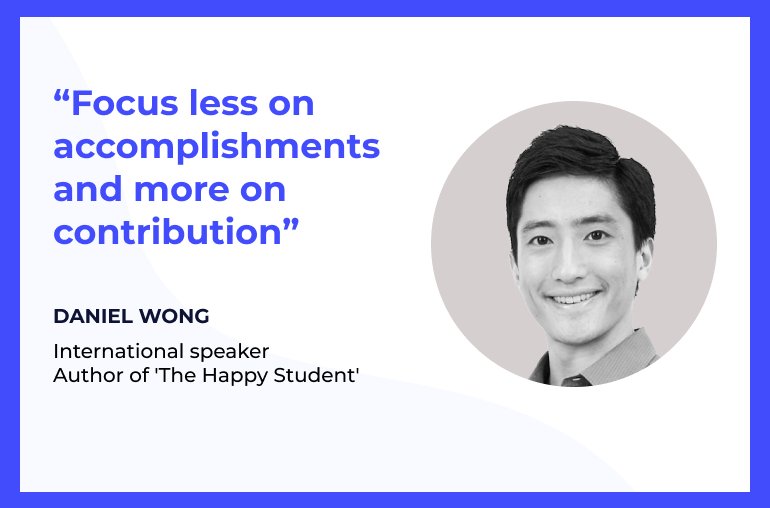Hardly anyone is born with the feeling that learning is important. It’s something that many of us are likely to embrace after high school graduation or even later. Who holds the key to student motivation so that they can be engaged in the knowledge discovery process? Surely, parents and instructors are involved. They can eventually help students establish their goals and find the pathway to reach them.
Here’s when fellow students also contribute greatly by showing their interest toward studies and the progress they make.
To see the world of academia through the eyes of a student and better grasp their potential motivation drivers, we’ve connected with Daniel Wong.
Daniel specializes in helping students become both successful and happy, and he shows parents how they can help, too. He is honored to be known as a learning and student life expert, and he is the bestselling author of The Happy Student: 5 Steps to Academic Fulfillment and Success.
Scroll down to discover his major highlights.
Unicheck: Being an all-time, straight-A student yourself, you’ve become an inspiration to students and an advisor to their parents. In your 20s, you published a bestselling book with a wide array of motivational techniques for teenagers. What has been encouraging you all the way up? What’s the best tactic to overcome frustration and disappointment as a student?
Daniel: I think that it’s always important to have a strong sense of purpose and to know what values you want to live by. This is something that I’m still learning how to do in my own life, but I find that too many students are focused on just getting good grades and becoming successful.
They haven’t defined what success means to them, so many of these pursuits can seem hollow in the long run. Without a deep sense of purpose, there’s only so long that you can feel motivated to just try and rack up more awards and achievements.
For me, my five core values are love, integrity, excellence, humility, and generosity. I’m definitely not perfect in living out these values, but by reflecting on these values at least once a week, it helps to keep me motivated. When students are confident that they’re living out the values that they want to embody, this will empower them to overcome frustrations and disappointments.
Unicheck: In one of your TedX talks, you mentioned the rule of 18-40-60 (when you’re 18 years old, you’re anxious to know what others are thinking about you; when you’re 40, you don’t bother about people’s opinions; but when you’re 60, you realize that no one ever has been thinking about you), which is very true. But it seems that today’s youth are more self-centered and confident than previous generations. How do we keep them engaged and show the meaning in academics?
Daniel: To keep today’s youth engaged, I believe the key is to help them to focus less on accomplishments and more on contribution. Too often, young people hear about what grades they should get, what schools they should go to, what jobs they should get, etc.
But this perspective isn’t what will motivate them to do their best, especially not for the young people who have grown up with many material comforts.
When the emphasis is on how they can learn more and acquire more skills so that they will be able to contribute more, this is the perspective that is more likely to help them to find meaning in academics. After all, they want to make a real impact in the world around them.
Unicheck: How has the virus lockdown impacted the learning process in your country? Has everyone managed to transition quickly to remote classes?
Daniel: The schools in Singapore (where I live) have all started to do home-based online learning. The government implemented this move decisively, and students and teachers have transitioned quickly to this mode of remote learning.
Unicheck: What can motivate students to participate in distant learning? How should online instruction be transformed to better fit the current state of affairs?
Daniel: Most students aren’t that excited about attending classes in general, partly because they lack a sense of autonomy. They often feel as if teachers are forcing them to learn topics that they aren’t interested in.
So, I don’t have definite answers to these questions, but I do think that students need to occasionally be given control over what content they learn, how they learn it, etc.
In terms of how I’ve seen teachers using online learning platforms, they often teach the live online class as if they were teaching an in-person class. But many of these online lessons could probably be pre-recorded so that students could watch the videos at their own time. Then the actual live class time could be used to clarify doubts, engage in other activities, etc.
Unicheck: Do you personally see any sense behind four-year colleges? Is there any chance that a competency-based learning model will gradually replace the classic one?
Daniel: I think that the competency-based learning model makes a lot more sense for most fields, as compared to the four-year college model. But in most countries, governments have a big say in terms of education policy, and it is difficult for governments to make changes quickly given the number of stakeholders that they’re dealing with, the scale of the changes necessary, etc.
So, I do think that the competency-based learning model will replace the classic one, but it will take years—possibly decades.
Unicheck: Is it still trendy to be a lifelong learner? What if you lack self-organization and don’t quite understand your professional perspectives to become one, should you force yourself to join the trend?
Daniel: I think that regardless of your life circumstances or age, it’s always good to be a lifelong learner, even if it’s not trendy (it stills seems trendy for now, though). As Dorothy Parker once said, “The cure for boredom is curiosity. There is no cure for curiosity.”
If you cultivate a deep sense of curiosity and wonder, you’ll become a lifelong learner—not just because doing so will help you to succeed in your career, but because it will enable you to lead a richer and more meaningful life.
Of course, it’s helpful to have self-organization skills, but then again, I’ve seen extremely disorganized people suddenly become extremely organized when it comes to things like keeping track of which episodes they’ve watched of a Netflix show or which movies they want to watch in the coming months.
Self-organization skills are also dependent on intrinsic motivation, so I believe that cultivating a genuine sense of curiosity about the world around you is a key step to becoming a lifelong learner.





